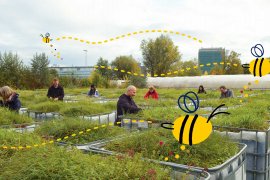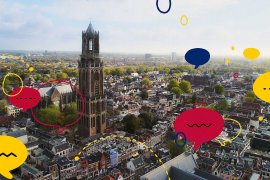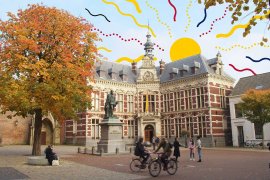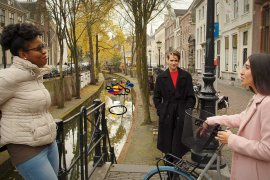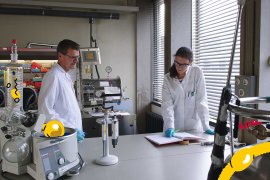Faculty of Humanities
The Strategic Plan of the Faculty of Humanities is embedded in the University's overarching strategic plan and outlines the course that the faculty intends to take in the coming years in order to achieve the shared University objectives, as well as the faculty’s own specific aims. We have developed this vision further in a separate implementation plan, which contains specific details with a time line.
The faculty of Humanities 2020-2025
Humanities in the Netherlands have an excellent reputation internationally, and, at national level, Utrecht University’s Faculty of Humanities is a leader in this field. A flourishing humanities sector is crucial to society. Even in a high-tech, globalised world, human life consists of more than just technology and trade: art, culture and history all play their part. In addition, the humanities make a vital contribution to the structure of today’s knowledge and service-based society (take the growing importance of media and communication, for example); they have the ability to both frame and intervene in the societal debate; and they are increasingly tasked with a role in addressing social problems, large and small.
Together, these observations form the core of what we want to be as a faculty: an internationally renowned faculty with a broad range of degree programmes and a broad range of research areas, both strategic and fundamental, which is not limited to the strategic themes and focus areas. The impact of this research is significant and multifaceted: economic and social, cultural, culturally critical, educational and formative. The impact of our education is no less significant: we train broadly educated, critical and socially engaged students who are ready to take up their place in the knowledge society, both in the Netherlands and abroad. The ever more multidisciplinary nature of research and education remains firmly rooted in a sound disciplinary foundation. We will maintain the wide range of degree programmes that we offer.
The trend for 'social engagement' will be pursued and strengthened in the years ahead.
The trend for 'social engagement' – using humanities disciplines, in education and research, to help solve a wide range of societal challenges – will be pursued and strengthened in the years ahead, both prominently in connection with the strategic themes (particularly Institutions for Open Societies and Dynamics of Youth), in the new focus areas and in the Utrecht Centre for Global Challenges, and within individual disciplines as well (through partnerships with museums, NGOs and social institutions and through professional education).
Our education and research combine local (Dutch language, culture, multiculturalism, history, heritage) with regional (European languages and cultures, perspectives on European cooperation, migration) and global perspectives (world history, international relations, post-colonial studies). In our internationalisation policy, we therefore focus on a carefully considered mix of courses taught in Dutch and other languages (not necessarily English). And it goes without saying that we take diversity into account in everything we do.
Our education and research combine local with regional and global perspectives.
Even in the humanities, digitisation - and reflection on digitisation - is becoming increasingly important. Building on successful initiatives such as the Digital Humanities Lab and the Data School, in 2020 the faculty launched a Centre for Digital Humanities, which brings together expertise in this field and facilitates acquisition of the necessary knowledge and skills by students and staff.
At national level, through our consultation channels (the Council of Deans in Arts and Humanities (DLG) and the Social Sciences & Humanities Council (SSH-beraad)), we are working on reinforcing the positioning of our disciplines and raising their profile in both the public and political arenas; aligning more effectively with the knowledge and innovation agendas of the top sectors and the related Knowledge and Innovation Covenant (KIC); closer cooperation between Dutch humanities faculties (e.g. within the Master Language programme and the National Platform for Languages); and on exploring the options for collaboration in connection with small programmes between the three LERU faculties in the Randstad region (University of Amsterdam, Leiden University, Utrecht University).
There are concerns over long-term funding for the humanities, even at national level. Nevertheless, over the next few years, the faculty expects, as planned, to return to a financially sound position. This assumes, however, that the current earning capacity is at minimum maintained.
The heavy workload also remains an area of concern, certainly now that the COVID-19 pandemic has obliged lecturers to rapidly transition to a new means of providing education and the majority of employees are working from home. The position of temporary lecturers remains an area for attention and concern as well. We are addressing these problems within the limited scope that we have, on the one hand by creating space in the system where possible and, on the other, through the 'Organisational culture and responsibility' programme which will be launched in 2020. Following a number of round table discussions in 2019, this programme should help make the organisation more efficient and safer and improve the cohesion of the faculty community – both factors which will reduce workload.

Organisation
HR policy
We continue to strive for a more diverse workforce. In an effort to create a more balanced selection process, explicit attention is paid in the recruitment phase to attracting female candidates and in our appointments advisory committees, we use a form which requires research and teaching performance to be measured against actual teaching and research FTEs. To increase the percentage of female professors (mid-2020: 30%), our aim is to ensure that two-thirds of new professor appointments over the period of the plan are women.
In line with the Recognition and Rewards project initiated by the Association of Universities in the Netherlands (VSNU), we are keen to take aspects other than purely (quantitative) research output into account when assessing academic staff. In addition, the Faculty of Humanities wants to assess all staff (both academic staff and support and management staff) on both their individual and team performance. Our aim is to develop criteria which will enable us to recognise and reward teams and partnerships for their collaborative work. With this in mind, the faculty plans to introduce a new model by 2025. In 2020, we will explore the extent to which the MERIT model might serve as an example in this regard. The MERIT model is used to evaluate academic staff at universities and addresses five domains: Management, Education, Research, Impact and Team Spirit.
Our aim is to develop criteria which will enable us to recognise and reward teams and partnerships for their collaborative work.
The faculty has built up a good track record in the field of rewarding education, having appointed both professors and associate professors based on their performance in education, educational management and educational policy and innovation.
Compared to other faculties, our faculty has a large number of associate and full professors. This is largely due to the number of degree programmes that we offer. While we are keen to facilitate the professional and personal growth of all faculty employees, the financial constraints and the staffing principle restrict the opportunities for advancement. Given the current financial situation and the high average staffing costs, expectation management will therefore be necessary.
Our faculty also has a flexible workforce of temporary lecturers who are deployed to accommodate fluctuations in enrolment and to replace researchers working on external projects. We are aware of the vulnerable position of these employees within the faculty community, and strive to offer this group long-term contracts for a substantial number of hours wherever possible.
In the case of support and management staff, more attention will be paid to the work of multidisciplinary and other teams, with a specific focus on collaboration between support and management staff and academic staff. A balance between the development, mobility and sustainability of support and management staff is important, the aim being on the one hand to provide high-quality flexible support and, on the other, to create a work culture in which support and management staff feel valued.
Organisational culture and responsibility
In autumn 2020 we will present a vision for organisational culture which will act as a benchmark in a wide variety of contexts (e.g. recruitment and selection and the annual Assessment & Development cycle) and which will provide direction for all our staff. In a nutshell, this vision is as follows: taking responsibility and, where relevant, showing good leadership is part of your job. The faculty must reflect the core values that we have formulated in this vision: Professionalism, Transparency, Responsibility, Connectedness and Safety.
Finances
The Faculty of Humanities plans to modify its internal financial allocation models in order to achieve a better balance overall (see sections 3 and 4). This review will give departments more scope to make decisions regarding the organisation of education and research within the constraints of faculty frameworks. Adjusting the reserve policy was the first step towards reducing the differences between the financial situation of the various departments.
In the existing teaching allocation model, the relationship between available resources and expenditure has diverged. The teaching load model has become more of a funding model than a teaching model. We are moving towards an allocation model that establishes a more direct relationship between available resources and expenditure, in which we will reduce micromanagement and include incentives for efficiency, educational innovation and greater flexibility and enables degree programmes large and small to continue to offer good education in a responsible way.
It is important that employees and students be able to meet one another live.
Agile organisation
The COVID-19 pandemic has demonstrated that the Faculty of Humanities can be agile, flexible and innovative. The rapid switch to online and remote working has resulted not only in negative changes but also in positive changes from which the organisation can learn. The rapid deployment of IT tools, particularly in education, offers the potential to promote further innovation and agility in the organisation in the future. At the same time, the pandemic has highlighted the importance of contact in the community, intensive and otherwise: it is important that employees and students be able to meet one another live.
Together with its partners in the city centre, the Faculty of Humanities is delivering an integrated accommodation plan. This ensures that the wishes of the various departments are clear and aligned with available real estate. We are in the process of realising a work environment in which everyone has an effective workspace within their own community that complies with the new workplace standard. In addition, student associations will be assigned accommodation in the vicinity of their degree programme in order to maintain strong ties with the programme and to strengthen the sense of community.
We will also use the Strategic Accommodation Plan (SAP) as a means of encouraging multidisciplinary collaboration (academic staff and support and management staff), to make operations more sustainable where possible and to further strengthen the (digital) infrastructure for education, research and operations. The SAP also provides scope for more intensive collaboration in the field of support staff in the city centre.
Internationalisation
The Faculty of Humanities is consolidating its existing internationalisation policy. International staff and students feel at home in the faculty and the broadening from Warm Welcome to Warm Stay applies to all. There is a specific focus on young academics, for whom an international experience can be crucial for their professional development and career opportunities. Structured collaborations provide excellent testing grounds for further development.
Education
Student well-being
We support student well-being by deploying an adequate number of study advisers and providing adequate support. The Faculty of Humanities has appointed wellness trainers to develop and provide prevention-oriented training sessions and working groups on topics such as managing the pressure to succeed, learning to study, prioritising tasks and graduation. By 2025, it will be clear whether the additional funding under the quality agreements has contributed to an improvement in student well-being.
Together with the student members of the Faculty Council, we are developing an initiative that will enable student well-being to be monitored more effectively. In addition, we are investigating how we can improve communication with students.
Student well-being also includes the opportunities that students experience for further development; we support this by offering opportunities such as the smart electives programme 'Kies op Maat' and the flexible study programme 'Flexstuderen' and the opportunity to take multidisciplinary courses both within the faculty and outside it. Lecturers support this development by developing projects in Utrecht Education Incentive Fund (USO) and Educational Resources Pool (EMP) programmes (incentive funds for educational development). Career Services provides support and advice with regard to prospects and plans for the future.
Diversity and inclusiveness
We want to become more diverse, in the broadest sense of the word. Diversity contributes to the quality of the academic debate. The Faculty of Humanities plays a prominent role in the University’s diversity initiatives. In the University's Student Intake and Selection Diversity (DIS) project, which Humanities had a hand in initiating, four of our faculty's leading programmes are working on specific plans to attract a more diverse student population.
We want to become more diverse, in the broadest sense of the word. Diversity contributes to the quality of the academic debate.
The Faculty of Humanities also plays a pioneering role in equal opportunities education in Utrecht: Honours Trajectum Utrecht, which was developed by the faculty and offers extra-curricular education to talented secondary school pupils who come from a social background where university study is not the norm, is a longstanding UU-wide initiative. By working with other University projects (Debuut, U-Talent diversity & inclusion, Speedcoaching, Opmaat), with schools and with the municipality (successor of Brede School Academie Utrecht), we aim to create an uninterrupted learning pathway between primary education and the first year at Utrecht University, and thereby a more diverse student population as well.
Teaching model
We are reviewing the teaching model in line with the review of the allocation model (see 2.4): within a faculty framework, we are giving educational directors and lecturers/teaching teams greater freedom to shape the curriculum, with a good balance between quality of education and workload.
The review of the teaching model is inextricably linked to the strengthening of engaging education through the facilitation and promotion of IT in education. We do this by providing support and professional development for lecturers, by contributing to or coordinating (faculty) educational innovation projects and by using blended learning to support flexible study and Professional Education, for example, whereby face-to-face and online learning will always coexist.
Sustainable Development Goals
The link between our education and the United Nations’ Sustainable Development Goals lies mainly in themes such as the strength of institutions, social justice, equality and inequality, gender, citizenship and education, heritage and heritage protection, inclusiveness and exclusion, responsible economic growth, international relations and peace, security and terrorism. These themes are central to many Bachelor's and Master's programmes. In the years ahead, the faculty will deliver the existing education regarding these themes more visibly to students in Osiris. In addition, over the forthcoming period, we will further strengthen the position of the strategic themes in our education.
We are keen to expand our tradition of developing multidisciplinary initiatives from a strong, disciplinary basis to the Master's level.
Multidisciplinarity
The faculty offers a wide range of single-discipline and multidisciplinary programmes in both Bachelor's and Master's phase. We will continue to offer courses that entice Bachelor's students to study outside of their own discipline; we are investing in making these opportunities more accessible to other faculties and, by doing so, are encouraging inter-faculty study. In addition, over the next few years, we are keen to expand our tradition of developing multidisciplinary initiatives from a strong, disciplinary basis to the Master's level.
During the planning period, we will start with the Master’s in Medical Humanities, which we are developing in conjunction with the Faculty of Medicine. The Faculty of Humanities is also partnering with Geosciences in the development of the Master's in Global challenges for sustainability, under the auspices of the CHARM-EU (Challenge-driven, Accessible, Research-based Mobile European University) project. And finally, the Faculty of Humanities is closely involved in the exploration and development of a new Master's concept in connection with Utrecht University's alliance with Eindhoven University of Technology, Wageningen University and University Medical Centre Utrecht.
Professional education
The Faculty of Humanities is developing a wider range of courses and programmes in the field of Professional Education. We are supplementing existing initiatives, for example in the hubs within Institutions for Open Societies, but also in other social domains where we see opportunities. In doing so, we are intensifying our cooperation with the Faculty of Law, Economics and Governance.
Internationalisation
To ensure that the student population that is able to benefit from the added value of an international experience is as large and diverse as possible, we are developing multiple forms of virtual and physical mobility. In order to achieve this objective, we will take a different approach to our international partners: by 2025 we will have fewer partners and more intensive contact with a select group.
Differentiated language policy
Our faculty delivers degree programmes in Dutch, English, a combination of the two and other languages (German, French, Italian, Spanish) and has expertise in the Western European languages and major cultural languages such as Greek, Latin and Arabic, because we believe that our students and alumni must be able to work in a multilingual world. We are continuing to elaborate a differentiated language policy, taking the different learning pathways and programmes into account. In addition, the Faculty of Humanities is committed to promoting Dutch language proficiency within Utrecht University.
We are strengthening the infrastructure which enables students, lecturers and support and management staff to develop their Dutch and English language skills at a professional level.
Research
Research allocation model
The faculty currently has a system of research funding (so-called ‘dynamisation’) in which employees’ performance is assessed once every three years and research time is allocated on that basis. The system is labour intensive, generates workload and is not sustainable because it results in higher research expenditure than is actually obtained through government funding. We currently offset the latter by means of a high income generation requirement (the amount of research funding that departments must obtain from grants and business and industry), which puts departments under a great deal of pressure. At the end of the current three-year ‘dynamisation’ period in 2022, the research resources available from government funding will be redistributed, without an assessment procedure and with new fixed standards. We plan to present a proposal for a new allocation key in autumn 2020. This will allow the income generation requirement to be reduced, which (in the long term) will give departments scope to obtain policy resources for research (e.g. for seed money or for temporarily increasing the research time of employees).
Open Science
On the theme of Outreach and Public Engagement, the humanities already have a long tradition of sharing research results with a broad public, collaborating with external stakeholders and outreach, for example to secondary education. We intend to carry on this tradition. Each research institute and each research programme has its own narrative around the impact of its research, and impact will feature as standard in A&D interviews.
Impact will feature as standard in A&D interviews.
Following completion of the Centre for the Humanities, we will embed the key contacts with the cultural sector and the city at the heart of our faculty organisation, in part via a joint effort with the Centre for Science and Culture. To this end, we will allocate a dedicated budget for outreach and public engagement activities to the research institutes.
On the theme of Open Access, 'intelligent progress’ will be encouraged, taking into account the fact that the humanities cannot meet the requirements of 'Plan S’ in all respects and not always at the pace desired by others. Take the problems around book publications, collections, 'hybrid' publications and publications with learned societies, for example.
We will assign primary responsibility for the theme Fair Data and Software to the Centre for Digital Humanities. In addition to the existing faculty ethical review committee and data manager, 2020 also saw the appointment of a privacy officer (in conjunction with the Faculty of Law, Economics and Governance).
Sustainable Development Goals
A broad range of degree programmes goes hand in hand with a broad range of discipline-based research areas, which we are committed to maintaining. Many of these areas are already linked (often in a multidisciplinary context) to the United Nations’ Sustainable Development Goals: in a number of the hubs of the strategic theme Institutions for Open Societies (such as Gender and Diversity), in the focus areas and in the activities of the Centre for Global Challenges, for example. With regard to a number of themes, there are interesting opportunities for collaboration in education and research within the alliance with the Eindhoven University of Technology (‘human artificial intelligence’, etc.) and Wageningen University & Research (on themes such as 'healthy urban living'), which we will further develop over the forthcoming period.
Strengthening of PhD programmes
In accordance with the quality plan introduced in 2019, over the next few years, the Graduate School of Humanities will focus intensively on the training of PhD supervisors, educational training for PhD candidates and more transparent communication with regard to thesis requirements. In collaboration with our international partner White Rose College (UK), amongst others, we are working on careers guidance for PhD students. In consultation with our PhD Council, we are developing new initiatives to improve the well-being of PhD candidates. As of September 2020, there will be a greater focus on academic integrity in the PhD training.


